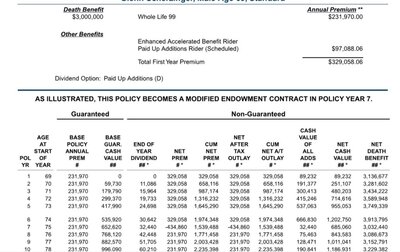I am looking at opening a policy to partially use for the IBC method as well as the death benefit. I have come across something I am not able to fine clear answers on and few insurance guys are contradicting each other.
Mass mutual salesman keep touting a 4% guaranteed plus dividends and the Penn appears to be 2% guaranteed plus dividends. That 2% over the life of a contract could really add up, but Im not getting very straight answers. Anyone here mind helping a consumer out that is new to this?
Mass mutual salesman keep touting a 4% guaranteed plus dividends and the Penn appears to be 2% guaranteed plus dividends. That 2% over the life of a contract could really add up, but Im not getting very straight answers. Anyone here mind helping a consumer out that is new to this?

